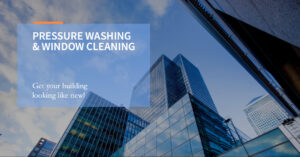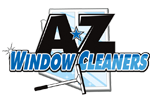
Ever wondered how those high-rise buildings maintain their sparkling exteriors? Or perhaps you’ve questioned the safety of washing the exterior of your house? Well, you’re in the right place! This article will answer all your questions about Exterior Building Pressure Washing & Window Cleaning Services.
The Importance of Exterior Building Cleaning
Maintaining the exterior of a building is not just about aesthetics. It’s about preserving the integrity of the structure, enhancing its value, and ensuring a safe and healthy environment for its occupants. This is where pressure washing and window cleaning services come in.
The Difference Between Power Washing and Pressure Washing
While both power washing and pressure washing involve the use of high-pressure water to clean surfaces, there’s a key difference. Power washing uses hot water to remove tough stains and grime, while pressure washing uses normal temperature water and often includes cleaning agents.
How Professionals Clean High Buildings
Cleaning high buildings is a task that requires specialized equipment and expertise. Professionals use high-pressure washers with long hoses and adjustable nozzles to reach high areas. They also use safety equipment like harnesses and helmets to ensure their safety while working at heights. Check out this Article on the Future of High Rise Cleaning
The Safety of Washing the Exterior of a House
Pressure washing the exterior of a house is generally safe when done correctly. However, it’s important to take certain precautions. For instance, you should avoid washing areas around electrical outlets or fixtures, and you should always wear protective gear.
Precautions to Take When Pressure Washing
When pressure washing, it’s important to use the right pressure to avoid damaging the surface. Also, you should never point the pressure washer at people or animals, and you should always wear protective gear like gloves and goggles.
The Right Equipment for Safe Washing
Using the right equipment is crucial for safe and effective pressure washing. This includes a reliable pressure washer, the correct nozzles, protective gear, and cleaning solutions suitable for the surface you’re cleaning.
Pressure Washing Without Damaging Concrete
Pressure washing can be a great way to clean concrete surfaces, but it’s important to do it correctly to avoid causing damage. This involves using the right pressure, the correct cleaning solutions, and washing in a consistent and even manner.
The Correct PSI for Different Surfaces
The ideal PSI (pounds per square inch) for pressure washing varies depending on the surface. For instance, softer surfaces like wood may require a lower PSI, while harder surfaces like concrete can withstand a higher PSI.
Techniques to Avoid Damage
To avoid causing damage when pressure washing, it’s important to use the right techniques. This includes starting with a low pressure and gradually increasing it as needed, maintaining a consistent distance from the surface, and never pointing the pressure washer at a single spot for too long.
The Recommended PSI for Pressure Washing
The recommended PSI for pressure washing depends on the surface you’re cleaning. For instance, delicate surfaces like glass or painted wood typically require a lower PSI, while tougher surfaces like concrete or brick can handle a higher PSI.
Factors Influencing the Ideal PSI
Several factors can influence the ideal PSI for pressure washing, including the type of dirt or stain you’re trying to remove, the surface material, and the age and condition of the surface.
PSI Guidelines for Different Materials
As a general guideline, softer materials like wood or vinyl siding typically require a PSI of around 1200 to 1500, while harder materials like concrete or brick can handle a PSI of 2500 to 3000.
The Benefits of Professional Cleaning Services
While it’s possible to do pressure washing and window cleaning yourself, there are many benefits to hiring professionals. Not only do they have the expertise and equipment to do the job safely and effectively, but they can also save you time and effort.
Why You Should Consider Hiring Professionals
Professional cleaning services can help maintain the appearance and integrity of your building, enhance its value, and ensure a safe and healthy environment for its occupants. Plus, they can save you the time and hassle of doing the job yourself.
The Long-Term Advantages of Regular Exterior Cleaning
Regular exterior building washing and window cleaning can help prevent the buildup of dirt, grime, and mold, which can cause damage over time. It can also help maintain the appearance of your building, enhance its curb appeal, and increase its value.
Conclusion
In conclusion, exterior building pressure washing and window cleaning services play a crucial role in maintaining the appearance and integrity of buildings. Whether you’re a building owner, manager, or occupant, understanding these services can help you make informed decisions about building maintenance.
FAQs
- How often should I have my building pressure washed? Regular pressure washing is recommended, but the frequency depends on the local climate and the building’s exposure to dirt and pollutants. Generally, once a year is a good rule of thumb.
- Can pressure washing damage my windows? If done incorrectly, pressure washing can potentially damage windows. However, professionals use the right techniques and equipment to clean windows safely.
- What’s the best time of year to pressure wash my building? The best time to pressure wash is typically in the spring or fall, when the weather is mild. However, it can be done any time of year as long as the weather conditions are suitable.
- Can I pressure wash my building myself? While it’s possible to pressure wash your building yourself, it’s often best to hire professionals. They have the expertise and equipment to do the job safely and effectively.
- What should I look for when hiring a pressure washing service? Look for a company with good reviews, a solid track record, and a commitment to customer satisfaction. Also, make sure they’re licensed, insured, and follow industry safety standards.



Comments are closed